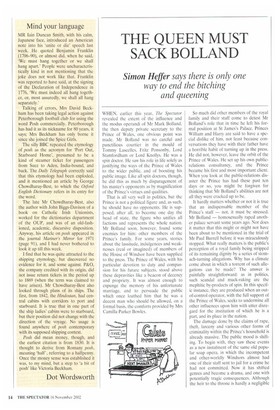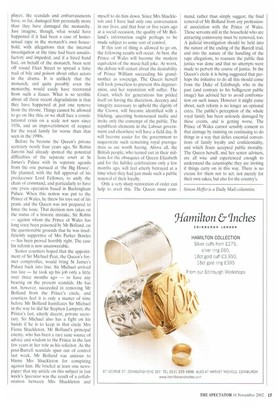THE QUEEN MUST SACK BOLLAND
Simon Heifer says there is only one way to end the bitching and queening
WHEN, earlier this year, The Spectator revealed the extent of the influence and the modus operandi of Mr Mark Bolland, the then deputy private secretary to the Prince of Wales, one obvious point was made. Mr Bolland was no careful and punctilious courtier in the mould of Tommy Lascelles, Fritz Ponsonby, Lord Stamfordham or Lord kiloflys. He was a spin doctor. He saw his role in life solely as justifying the ways of the Prince of Wales to the wider public, and of boosting his public image. Like all spin doctors, though, he did this as much by disparagement of his master's opponents as by magnification of the Prince's virtues and qualities.
That is all very well in politics, but the Prince is not a political figure and, as such, he should have no opponents. He is supposed, after all, to become one day the head of state, the figure who unifies all factions and represents the whole nation. Mr Bolland soon, however, found some enemies for him: other members of the Prince's family. For some years, stories about the lassitude, indulgences and weaknesses (real or imagined) of members of the House of Windsor have been supplied to the press. The Prince of Wales, with his particular devotion to duty and compassion for his future subjects, stood above these depravities like a beacon of decency and propriety. It was almost enough to expunge the memory of his unfortunate marriage, and to persuade the public which once loathed him that he was a decent man who should be allowed, on a formal basis, the comforts provided by Mrs Camilla Parker Bowles. So much did other members of the royal family and their staff come to detest Mr Bolland's role that in time he left his formal position at St James's Palace. Princes William and Harry are said to have a special dislike of him, not least because conversations they have with their father have a horrible habit of turning up in the press. He did not, however, leave the orbit of the Prince of Wales. He set up his own publicrelations consultancy, and the Prince became his first and most important client. When you look at the public-relations disaster the Prince has had these past ten days or so, you might be forgiven for thinking that Mr Bolland's abilities are not all they were cracked up to be.
It hardly matters whether or not it is true that an indispensable member of the Prince's staff — not, it must be stressed, Mr Bolland — homosexually raped another palace servant some years ago. Nor does it matter that this might or might not have been about to be mentioned in the trial of Mr Paul Burrell before it was miraculously stopped. What really matters is the public's perception of a royal family being stripped of its remaining dignity by a series of stomach-turning allegations. Why has a climate come about in which a torrent of such allegations can be made? The answer is painfully straightforward: as in politics, such scandal and muck-raking are the mephitic by-products of spin. In this specific instance, they are produced when an outof-control operator, with the full support of the Prince of Wales, seeks to undermine all other influences upon him with utter disregard for the institution of which he is a part, and its place in the nation.
The damage done by the claims of rape, theft, larceny and various other forms of criminality within the Prince's household is already massive. The public mood is shifting. To begin with, they saw these events as a new instalment of the same old popular soap opera, in which the incompetent and other-worldly Windsors almost had one of their staff sent to jail for a crime he had not committed. Now it has shifted genres and become a drama, and one with potentially tragic consequences. Although the heir to the throne is hardly a negligible player. the scandals and embarrassments have, so far, damaged him personally more than they have damaged the monarchy. Just imagine, though, what would have happened if it had been a case of homosexual rape in the monarch's own household, with allegations that the internal investigation at the time had been unsatisfactory and impeded; and if a hired hand had, on behalf of the monarch, been sent off round Fleet Street to spread a false trail of bile and poison about other actors in the drama. It is unlikely that the monarch, and quite possibly even the monarchy, would easily have recovered from such a fiasco. What is so terrible about all these recent degradations is that they have happened at just one remove from the throne. Things cannot be allowed to go on like this, or we shall face a constitutional crisis on a scale not seen since 1936, and an impoverishment of respect for the royal family far worse than that seen in the 1990s.
Before he became the Queen's private secretary nearly four years ago, Sir Robin Janvrin had already spotted the potential difficulties of the separate court at St James's Palace with its separate agenda from the one pursued at the Big House'. He planned, with the full approval of his predecessor Lord Fellowes, to unify the chain of command, and particularly to have one press operation based in Buckingham Palace. When this notion was put to the Prince of Wales, he threw his toys out of his pram, and the Queen was not prepared to force the issue. That decision now takes on the status of a historic mistake. Sir Robin — against whom the Prince of Wales has long since been poisoned by Mr Bolland, on the questionable grounds that he was insufficiently supportive of Mrs Parker Bowles — has been proved horribly right. The case for reform is now unanswerable.
Senior courtiers hoped that the appointment of Sir Michael Peat, the Queen's former comptroller, would bring St James's Palace back into line. Sir Michael arrived too late — he took up his job only a little over three months ago — to have any bearing on the present scandals. He has not, however, succeeded in removing Mr Bolland from the Prince's circle, and courtiers feel it is only a matter of time before Mr Bolland humiliates Sir Michael in the way he did Sir Stephen Lamport, the Prince's last, utterly decent, private secretary. Sir Michael also has a fight on his hands if he is to keep in that circle Mrs Fiona Shackleton, Mr BoIland's principal enemy, who has been a rare sane source of advice and wisdom to the Prince in the last few years in her role as his solicitor. As the post-Burrell scandals spun out of control last week, Mr Bolland was anxious to blame Mrs Shackleton for conspiring against him. He briefed at least one newspaper that my article on this subject in last week's Spectator was the result of a collaboration between Mrs Shackleton and
myself to do him down. Since Mrs Shackleton and I have had only one conversation in our lives, and that four or five years ago at a social occasion, the quality of Mr Bolland's information ought perhaps to be made subject to some sort of control.
If this sort of thing is allowed to go on, the following results will occur. At best, the Prince of Wales will become the modern equivalent of the music-hall joke. At worst, the debate will restart about the desirability of Prince William succeeding his grandmother as sovereign. The Queen herself will look powerless to prevent this degeneration, and her reputation will suffer. The Court. which for generations has prided itself on having the discretion, decency and integrity necessary to uphold the dignity of the Crown, will become identified with a bitching, queening homosexual mafia and invite only the contempt of the public. The republican elements in the Labour government and elsewhere will have a field day. It will become easier for the government to sequestrate such remaining royal prerogatives as are worth having. Above all, the British people, who turned out in their millions for the obsequies of Queen Elizabeth and for the Jubilee celebrations only a few months ago, will feel utterly betrayed at a time when they had just made such a public renewal of their loyalty.
Only a very sharp restoration of order can help to avert this. The Queen must corn
mand, rather than simply suggest, the final removal of Mr Bolland from any professional association with the Prince of Wales. Those servants still in the household who are attracting controversy must be removed, too. A judicial investigation should be held into the nature of the ending of the Burrell trial, and into the nature of the handling of the rape allegations, to reassure the public that justice was done and that no attempts were made to pervert the course of justice. In the Queen's circle it is being suggested that perhaps the initiative to do all this should come from the Duke of Edinburgh, who in the past (and contrary to his belligerent public image) has advised her to avoid confrontation on such issues. However it might come about, such reform is no longer an optional extra. The public's perception of the whole royal family has been seriously damaged by these events, and is getting worse. The Prince of Wales cannot sensibly consent to that damage by insisting on continuing to do things in a way that defies essential conventions of family loyalty and confidentiality, and which flouts accepted public morality. The Queen herself, and her senior advisers, are all wise and experienced enough to understand the catastrophe they are inviting if things carry on in this way. There is no excuse for them not to act; not merely for their own sakes, but also for the country's.
Simon Heifer is a Daily Mail columnist.



























































































 Previous page
Previous page